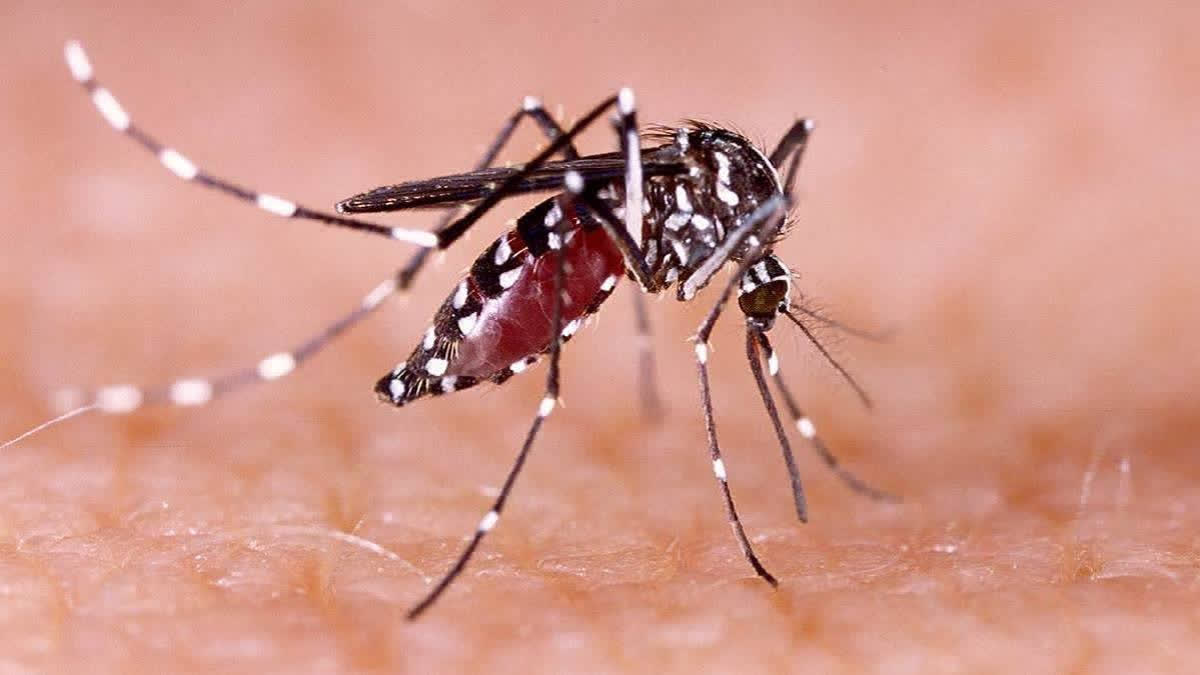New Delhi: India has reported 1,11,807 cases of mosquito-borne diseases till date this year whereas 44 officially confirmed deaths have also been reported due to infectious diseases, including malaria, dengue, kala-azar and chikungunya. According to the World Health Organisation (WHO), mosquito-borne diseases account for more than 17% of all infectious diseases, causing more than 7,00, 000 deaths annually.
“They can be caused by parasites, bacteria or viruses and lead to malaria, dengue, Zika, yellow fever, among others. Many of these diseases are preventable, through protective measures and community mobilisation,” the global health watchdog has said.
It said that in tropical and subtropical countries, the virus-causing dengue is spiking. “Close to a historic high of over six million cases and more than 7,000 dengue-related deaths were reported in over 80 countries and territories in 2023. Most places in Europe remain, too, cool to favour the mosquito or the virus, but imported dengue cases have been rising in the European region and the impact of climate change appears to be shifting the picture,” the WHO said.
Malaria
According to the Health Ministry data in possession of ETV Bharat, 76,387 confirmed malaria cases with 12 deaths have been reported in India this year with Odisha (18,383), Jharkhand (12,439) and Chhattisgarh (12,240) are the top three states with maximum number of cases.
The cases of malaria in 2023 were 2,27,564 with 83 deaths. Odisha with 33,684 cases, followed by Jharkhand (34,087) and Chhattisgarh (31,706) are the top three states registering maximum numbers.
In 2022, India reported 1,76,522 malaria cases with 83 deaths. States like West Bengal (40,594), Chhattisgarh (30,029) and Odisha (23,770) registered maximum cases.
Dengue
As per the government data, India registered 32,091 cases and 32 deaths in 2024. Kerala with 8,115 cases and 22 deaths, Karnataka 5,976 (five deaths) and Tamil Nadu 4,778 (two deaths) are the top three states registering maximum caseload and casualties due to dengue.
In 2023, a total of 2,89,235 cases and 485 deaths were registered in India. Uttar Pradesh registered 35,402 cases and 36 deaths, West Bengal 30,683 (four deaths) and Bihar 20224 (74 deaths). Similarly, in 2022 a total of 2,33,251 cases and 303 deaths have been reported in India with West Bengal registering 67,271 cases and 30 deaths, Uttar Pradesh 19,821 cases and 33 deaths and Bihar with 13,972 cases and 32 deaths topping the list of states registering maximum dengue incidents.
Kala-azar
In 2024, a total of 263 Kala-azar cases were reported across the country with Bihar registering 156 cases. Jharkhand registered 86 Kala-azar cases and West Bengal 13. Only one death due to Kala-azar has been reported in Uttar Pradesh this year.
In 2023, India reported a total of 520 where Bihar with 329 cases and three deaths topped the list of states, followed by Jharkhand at 154 and West Bengal at 17. Last year also one death was reported in Uttar Pradesh.
A total of 818 cases and three deaths have been reported due to Kala-azar in 2022 with Bihar registering 550, Jharkhand 188 and one death and West Bengal registering 52 cases. West Bengal also reported two deaths and Jharkhand one.
Chikungunya
In 2024, a total of 3,066 chikungunya cases were reported in India where Karnataka with 899, Maharashtra with 794 and Tamil Nadu with 331 were the top three states registering the maximum number of cases.
In 2023, a total of 11,477 chikungunya cases were reported in India with 2,072 cases in Punjab, followed by 1,910 in Karnataka and 1,702 chikungunya cases reported from Maharashtra.
India registered a total of 8,067 chikungunya cases in 2022 whereas Karnataka with 2,312, Maharashtra with 1,087 and Gujarat with 1,046 remained the top three states with the maximum number of such cases.
“There is an upsurge noted in the number of cases of some of the arboviral diseases like dengue and chikungunya especially in the urban areas of the country. This has happened due to the favourable environment available in these areas to the vector Aedes mosquitoes,” an official from the National Centre for Vector Borne Diseases Control (NCVBDC) said.
According to NCVBDC, effective control of vector mosquitoes with the help of community support and increased awareness is very important to control the transmission of these diseases.
“The role of both private and public sector healthcare providers in these areas is very important to increase the awareness in the community and motivate the people to reduce the breeding sources of the vector. A network of 769 sentinel surveillance hospitals and 17 apex referral laboratories with advanced facilities located in 35 states and UTs for diagnosis of dengue and chikungunya has been established in the country where antigen and both antibody-based case detection kits are available,” the official said.
The NCVBDC is the programme for the prevention and control of these vector-borne diseases as an integral part of the National Rural Health Mission (NRHM) of India.
Read more: World Mosquito Day - Accelerating The Fight Against Malaria For A More Equitable World



